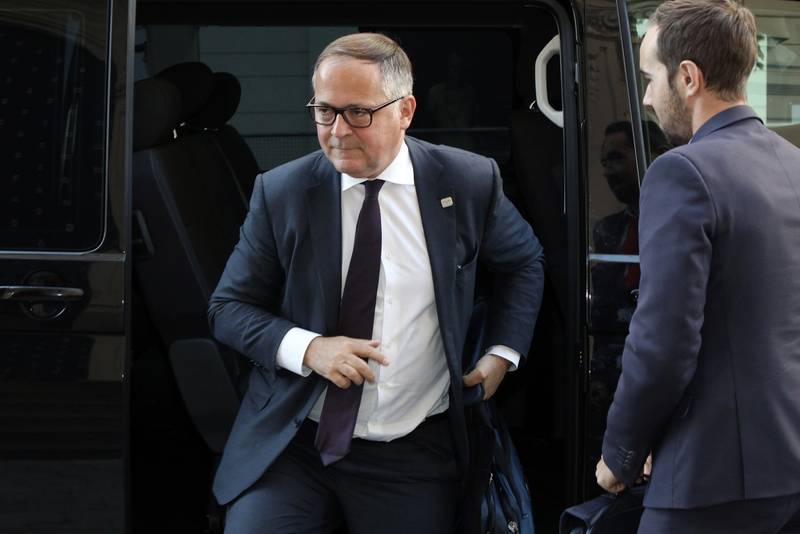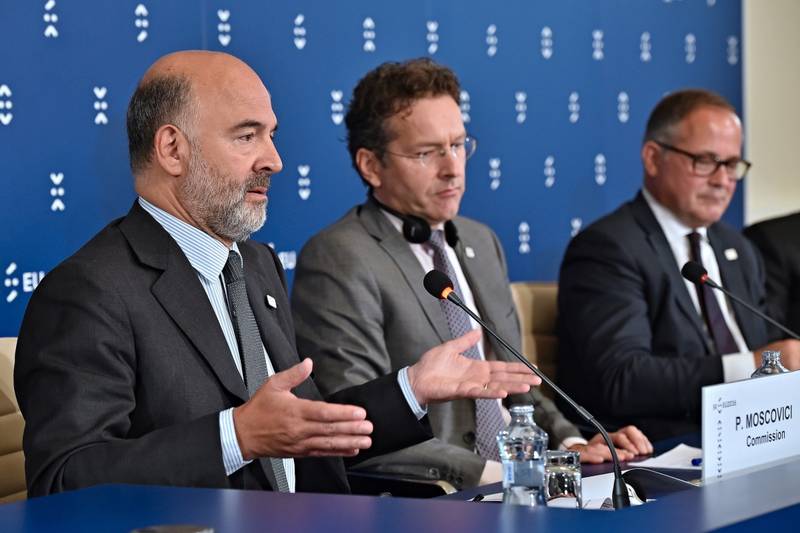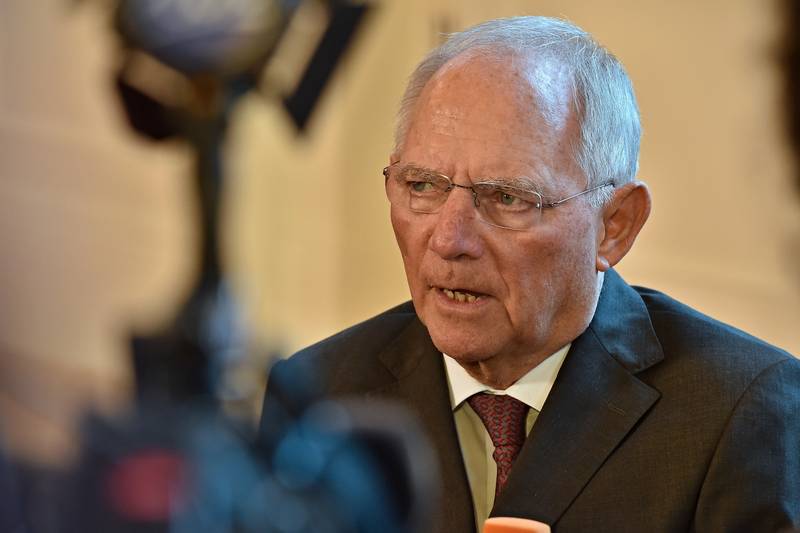Commission's Politicalness Is Already Causing Anxiety in the ECB
Adelina Marini, September 14, 2016
 Something unusual happened on Friday noon, heralding a very tough discussion on the future of Europe, which is already difficult. This happened following the informal meeting of the Eurogroup in Bratislava, which was supposed to send out the usual messages towards Greece on the implementation of its third bailout programme, as well as announce some rather boring issues. And, as expected, at the beginning the press conference, following the meeting, dealt with exactly that, but the inevitable happened and questions were raised about the fairness of the European Commission's decision once again to not punish Spain and Portugal for their systemic infringements of fiscal rules and using a very populist argument at that – the rise of populism and Euroscepticism.
Something unusual happened on Friday noon, heralding a very tough discussion on the future of Europe, which is already difficult. This happened following the informal meeting of the Eurogroup in Bratislava, which was supposed to send out the usual messages towards Greece on the implementation of its third bailout programme, as well as announce some rather boring issues. And, as expected, at the beginning the press conference, following the meeting, dealt with exactly that, but the inevitable happened and questions were raised about the fairness of the European Commission's decision once again to not punish Spain and Portugal for their systemic infringements of fiscal rules and using a very populist argument at that – the rise of populism and Euroscepticism.
Provoked by a journalist’s question, or rather by the answer of the European Commissioner for Economic and Financial Affairs Pierre Moscovici (France, Socialists and Democrats), Benoît Cœuré, Member of the Executive Board of the European Central Bank (France), sent out some refined criticism, expressing the explicit reservation that his words are not specifically about Spain and Portugal. “The decisions on Spain and Portugal are joint decisions by the EC and Council and the ECB has no mandate here. But there is a higher stake here. We've got a fiscal framework in Europe, which is based on rules. We've agreed, and that's the wording of the 5 presidents' report, that the rules should be implemented in a transparent, consistent and predictable way. So, there is more than one stake here that we surely want to avoid a situation where the rules will not be implemented in a transparent, consistent and predictable way because that would put the credibility of the whole framework at risk”, said Benoît Cœuré.
He added that if a deeper fiscal union is the way to go, there needs to be a “transparent consistent and predictable framework” – words, which he repeated for the third time. “So, whatever the EC and Council decide - and I fully trust them to decide it the right way - but it has consequences also for the longer term”, was the unambiguous message of the French member of ECB’s Executive Board.
What is the EC’s decision on Spain and Portugal?
After spending years in granting Spain extensions so it could correct its excessive budget deficit and tolerating similar practises in Portugal, which went through a difficult period under the bailout programme of the Troika, the Council lost its temper this year and demanded that sanctions be levied on the two countries for systemic violations of the Stability and Growth Pact. At the presentation of this year’s country specific recommendations, the EC decided not to punish Spain and Portugal and granted them deferments once more. After the Council complained, on July 27th the Commission again decided not to fine Lisbon and Madrid and gave them a deferment to the deferments.
During the spring, the EC gave Spain a deadline by 2017 to correct its budget deficit, asking Madrid to shrink it to 3.7% of Gross Domestic Product this year, so that next year it could drop below the 3% threshold down to 2.5%. On July 27, the Commission backed down from this allowance by granting Madrid one more year to return within bounds – 2018. Besides, for this year the EC allowed Spain to lower its budget deficit down to 4.6% instead of 3.7% and for next year down to 3.1% of GDP, instead of 2.5%. In 2018, Spain must bring its deficit down to 2.2% of its Gross Domestic Product.
Regarding Portugal, the EC asked in spring that its budget deficit drops to 2.3% of GDP and recommended that the country makes a fiscal correction of minimum 0.6% of GDP next year. Portugal was also expected by February of next year to make a full analysis of expenditures on all levels of public administration. In July, however, the EC loosened Portugal’s belt by setting a new target for budget deficit of 2.5% of GDP. Moreover, the Commission’s decision says that this target does not include the aftermath of a possible aid to struggling banks.
The Commission was forced to give long explanations on why it did take this decision, which apart from not provisioning any fines, postpones the decision for cutting off of European funds, which is a part of the sanctions for violating fiscal rules. The EC acknowledges reformist efforts of both states and so recommends that the Council does not fine them. The Commission’s Vice President in charge of the euro, Valdis Dombrovskis (Latvia, EPP), reminded that the law allows discounting and even annulment of fines in the case of extraordinary circumstances. He explained that both states have made considerable effort over the last seven years and have achieved considerable consolidation of their public finances. It should not be forgotten, he further said at the announcement  of the decision, that the two states are facing some very deep social challenges – high unemployment.
of the decision, that the two states are facing some very deep social challenges – high unemployment.
“I think we took the wisest decision in economic terms. Even a symbolic fine would not have been understood by people . . . A punitive approach would not be the right one at a time when people doubt in Europe”, explained at the time Commissioner Moscovici. And this is exactly what is wrong. Not that the EC has made one more allowance to Spain and Portugal, for it has done it on several occasions already. The problem is in the argumentation which it did it with. As the Brexit shows, the battle against Euroscepticism is only successful when it is demonstrated that “their” solutions lead to disasters, not by removing rules, designed to deal with a crisis, brought to a large account by not following rules. Moreover, the creation of new rules required a huge amount of energy and time.
"The Commission’s decision not to propose sanctions for Spain and Portugal out of fear of increasing Euroscepticism in these countries does not take into account the fact that the decision will fuel Euroscepticism in countries which follow the rules. We would have preferred a decision that had recommended a small but symbolic fine, sending a clear political message to governments that fiscal rules need to be taken seriously", said then the influential MEP Sylvie Goulard (ALDE, France), member of the European Parliament’s economic committee.
Surrounding the announcement of the EC’s decision there was a lot of speculation in large international media that there was heavy pressure not to fine the two states exerted by German Finance Minister Wolfgang Schäuble. A question by a Dutch journalist during the press conference following the Eurogroup on September 9 enraged Pierre Moscovici, who must have understood the message of his countryman Benoît Cœuré quite correctly, despite quoting it in a completely different context in his outflow, during which he even abandoned the diplomatic tone.
"Again, sorry to interrupt but I'm fed up with that kind of accusations or attacks on the EC in a period when people see that populism is a threat and that the EC is under attack", said Moscovici and underlined that the Commission’s decisions are not politicised. “We're a political commission not a politicised commission.” He approached clarifications on the subject like Pontius Pilate, explaining that the responsibility for the decision lies with the Council. “Decisions were taken in July following EC suggestions. They were approved by the finance ministers in August and these decisions have to be simply implemented”, he said. Eurogroup boss Jeroen Dijsselbloem (The Netherlands, Socialists and Democrats) sent the ball back in the EC’s court:
"I don’t know who has been calling who, whether that was a case of pressure or just getting informed. We have separate roles to play. The EC has its own role to play and then the Council comes into play. There was unanimous support from Council along those procedural lines. I am the greatest supporter of the EC for a very simple reason that I believe that the pact, which binds us all, needs an independent scrutiny and an independent referee and the EC is one to play that role", he said and reminded that when the fiscal rules were reinforced as a reply to the euro area debt crisis, everyone agreed that the EC should have a very strong, independent role in their implementation. He emphasised several times that the EU needs a strong Commission.
His message could be interpreted as being pointed at two addresses – the Commission, which is already amassing serious negatives because of its politicisation, and the Council, which is acting more and more as if the Commission is its appendage. If the EC does not perform its main role, that it was created for in the first place, namely guaranteeing the implementation of European law, the need for having it automatically vanishes. This in turn leads to a sizable decrease of the role of the European Parliament, for it is the only body to which the EC reports publicly and to which the Council is also accountable in some shape or another.
The marginalisation of these two key institutions is bringing the Union several steps backwards towards the intergovernmental approach, which allows member states to negotiate among each other and build unions within the Union. It is only a small step away from a situation similar to the one which led to creating the EU in the first place. It is thus perhaps indicative that Hungarian Prime Minister Viktor Orbán, who is the main engine behind disregarding European rules and laws in another sphere, requested just that – weakening the role of the European Parliament. In his traditional summer speech in front of the Hungarian minority in Romania, he stated that the biggest mistake of the EU in recent years is strengthening the role of the European Parliament.
 There has been talk in the EU for years about the future of the euro area. As a reply to the crisis, member states mandated in 2012 the President of the European Council with the preparation of a plan for deepening of integration. This plan was partially implemented and was later replaced by another one, known as the five presidents’ report. It contains a vision for considerable deepening of integration in the currency club, which will however prove impossible if rules are not followed, as Benoît Cœuré also noted. The decision of the EC and the Council to extend further allowances to Spain and Portugal is a serious obstacle not only to the deepening of the euro area, but also to its survival in its current form.
There has been talk in the EU for years about the future of the euro area. As a reply to the crisis, member states mandated in 2012 the President of the European Council with the preparation of a plan for deepening of integration. This plan was partially implemented and was later replaced by another one, known as the five presidents’ report. It contains a vision for considerable deepening of integration in the currency club, which will however prove impossible if rules are not followed, as Benoît Cœuré also noted. The decision of the EC and the Council to extend further allowances to Spain and Portugal is a serious obstacle not only to the deepening of the euro area, but also to its survival in its current form.
Mr Cœuré’s statement is a continuation to the stubborn repeating of ECB boss Mario Draghi that monetary policy by itself is not sufficient for full economic recovery. Last week he urged governments to speed up considerably the structural reforms which, he said, all member states need. In his words, fiscal policy should support economic recovery, but with full compliance with th Stability and Growth Pact rules.
In other words, it is a very bad signal that the EC is giving up on implementing the rules due to political reasons, while at the same time attempting to persuade Poland that rules are the things that make the EU the greatest achievement in Europe. If the EC is willing to dismiss rules because of the political situation in a certain member state, why is it concerned if another member state changes rules for its own reasons? The EC’s attitude towards fiscal policy is no less populism than the one it fears. Earlier this year the boss of the euro area’s bailout fund, Klaus Regling, stated in a speech in Poland that because of the crisis member states gave the Commission greater authority to enforce the new rules. “And I would like to encourage Brussels to take maximum advantage of that”, said Mr Regling in June.
Future of the EU and the euro area in particular will be a part of the conversations during the EU summit in Bratislava at the end of the week. Although the leaders’ agenda will be dominated by the problems with migration and terrorism, it is expected that economic subjects will also be fittingly represented. euinside will be in Bratislava and will inform you in detail about the talks there.
Translated by Stanimir Stoev
 Klaus Regling | © Council of the EU
Klaus Regling | © Council of the EU Mario Centeno | © Council of the EU
Mario Centeno | © Council of the EU Mario Centeno | © Council of the EU
Mario Centeno | © Council of the EU Federica Mogherini | © Council of the EU
Federica Mogherini | © Council of the EU | © Council of the EU
| © Council of the EU Luis De Guindos | © Council of the EU
Luis De Guindos | © Council of the EU